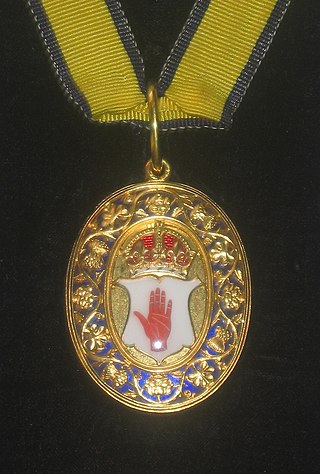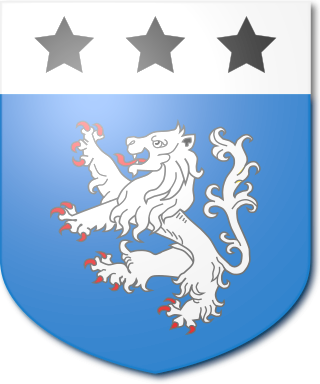
A baronet or the female equivalent, a baronetess, is the holder of a baronetcy, a hereditary title awarded by the British Crown. The title of baronet is mentioned as early as the 14th century; however, in its current usage it was created by James I of England in 1611 as a means of raising funds for the crown.

Baron Hazlerigg, of Noseley in the County of Leicester, is a title in the Peerage of the United Kingdom. It was created in 1945 for Sir Arthur Hazlerigg, 13th Baronet. He had previously served as Lord Lieutenant of Leicestershire. As of 2022 the titles are held by his grandson, the third Baron, who succeeded his father in that year.
There have been three baronetcies created for members of the Anstruther family, two in the Baronetage of Nova Scotia and one in the Baronetage of Great Britain. Two of the creations are extant while one is extinct.
There have been two baronetcies created for persons with the surname Colquhoun ("Cohoon"), one in the Baronetage of Nova Scotia (1625) and one in the Baronetage of Great Britain (1786).

There have been two baronetcies created for persons with the surname Burnett, one in the Baronetage of Nova Scotia and one in the Baronetage of the United Kingdom. As of 2010 one creation is extant while one is dormant.
There have been ten baronetcies created for persons with the surname Mackenzie, seven in the Baronetage of Nova Scotia and three in the Baronetage of the United Kingdom. Four of the creations are extant as of 2010.
There have been seven baronetcies created for persons with the surname Palmer, two in the Baronetage of England, one each in the Baronetages of Ireland and of Great Britain and three in the Baronetage of the United Kingdom. As of 2021, four of the creations were extant.

There have been four baronetcies created for persons with the surname Montgomery, one in the Baronetage of Nova Scotia, one in the Baronetage of Great Britain and two in the Baronetage of the United Kingdom. One creation is extant as of 2011.
There have been eleven baronetcies created for persons with the surname Robinson, four in the Baronetage of England, one in the Baronetage of Great Britain and six in the Baronetage of the United Kingdom. As of 2008 two of the creations were extant, while one was dormant.

There have been four baronetcies created for persons with the surname Hope, three in the Baronetage of Nova Scotia and one in the Baronetage of the United Kingdom. As of 2010 one creation is extant, one dormant and two extinct.
There have been three baronetcies created for persons with the surname O'Neill, two in the Baronetage of Ireland and one in the Baronetage of the United Kingdom.
There have been six baronetcies created with the surname of Leigh: two in the Baronetage of England, one in the Baronetage of Ireland, one in the Baronetage of Great Britain and two in the Baronetage of the United Kingdom. The only creation remaining extant is that of Altrincham.
There have been four baronetcies created for persons with the surname O'Brien, one in the Baronetage of Ireland and three in the Baronetage of the United Kingdom.
There have been three baronetcies created for persons with the surname Pole, one in the Baronetage of England, one in the Baronetage of Great Britain and one in the Baronetage of the United Kingdom. Two of the creations are extant as of 2008.
The Dalrymple-Hay Baronetcy, of Park Place in the County of Wigtown, is a title in the Baronetage of Great Britain. It was created on 27 April 1798 for Colonel John Dalrymple-Hay. Born John Dalrymple, he was the husband of Susan, daughter of Sir Thomas Hay, 3rd Baronet, of Park. On inheriting his father-in-law's estates in 1794 he assumed by Royal licence the additional surname of Hay. Four years later the baronetcy held by his father-in-law was revived in his favour. His grandson, the third Baronet, was an Admiral in the Royal Navy and Conservative politician. His third and youngest son, the fifth Baronet, was a Clerk in the Foreign Office from 1887 to 1895 and in the Privy Council Office from 1895 to 1928. On his death the line of the third Baronet failed and the title passed to the late Baronet's first cousin twice removed, the sixth Baronet. He was the eldest son of Brian George Rowland Dalrymple-Hay (1898–1943), a Colonel in the Indian Cavalry, son of George Houston Dalrymple-Hay (1865–1948), fifth son of George James Dalrymple-Hay (1828–1891), a Colonel in the Bengal Staff Corps, second son of the second Baronet. As of 2009 the title is held by the seventh Baronet's son, the eighth Baronet, who succeeded in January 2009.
There have been three baronetcies created for persons with the surname Stuart, one in the Baronetage of Nova Scotia, one in the Baronetage of England and one in the Baronetage of the United Kingdom. Two of the creations are extant as of 2008.
There have been two baronetcies created for persons with the surname Ramsden, one in the Baronetage of England and one in the Baronetage of the United Kingdom. One creation is extant as of 2008
There have been three baronetcies created for persons with the surname Foulis, one in the Baronetage of England and two in the Baronetage of Nova Scotia.

The Inglis Baronetcy, of Cramond, Edinburgh, was created in the Baronetage of Nova Scotia with remainder to heirs male whatsoever, on 22 March 1687 for James Inglis.

The InglisBaronetcy, of Gairloch, Ross-shire, was created in the Baronetage of Nova Scotia for Kenneth Mackenzie, on 22 February 1703. It is now known as Inglis of Glencorse, and the baronetage is listed as vacant.